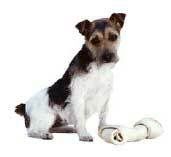
Dog Skin Allergies Caused by Inhalants
A common dog skin allergies cause, inhalants such as pollen, dust, mold and mildew can trigger off certain allergies in dogs. Unusually high quantities of these allergens may be found In certain environments, both in the home and outdoors. Outdoor allergens can be found in the form of pollens from trees (oak, ash, cedar), pollens from Bermuda grass and also ragweed pollens.
Symptoms Of Inhalant Dog Allergies
Inhalant allergy is known as atopy, the most common form of dog allergy. But unlike humans who react to inhalant allergy by coughs and sneezes,dog food allergies manfest in the form severe itching. When a dog suffers from an allergy, it will react by frenzied scratching and biting all over its body including its paws.
The extent of the itching may be so bad that it causes the dog to chew off turfs of fur leaving bald patches on its body. The most badly affected areas are often its armpits, flanks, groin and feet. Contrary to popular belief, such itching is not caused by fleas but by inhalant allergies.
If the dog bites itself to the extent of leaving skin lesions, inflammation can occur which leads to infection called atopic dermatitis.
Inhalant Allergies In Dog Breeds
Certain breeds of dogs are more susceptible to inhalant allergies. This is a genetic predisposition that makes some dog breeds to be more commonly affected.
These breeds include the Irish Setters, Schnauzers, Scottish Terriers, Boston Terriers, Cairn Terriers, West Higland White Terriers and Wire-Haired Terriers. Female dogs are more susceptible to inhalant allergies which usually occur within 3 years of a dog's growth.
 Treatment for Inhalant Allergies In Dogs
Treatment for Inhalant Allergies In DogsUnfortunately there is no cure for inhalant allergies in dogs. There are treatment options to control atopy symptoms but the best option would be to avoid the allergen. However, since this is almost impossible, certain desensitization therapy and treatment are used.
Weekly antigen injections can be used to help the dog become immune to allergens. Steriods and antibiotics can effectively reduce itching together with fatty acid supplementation to help relieve dog dander allergies.
No comments:
Post a Comment